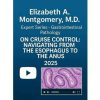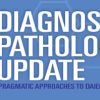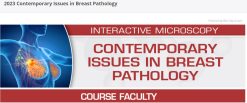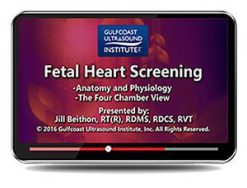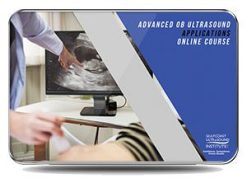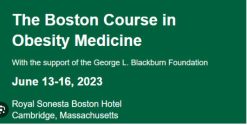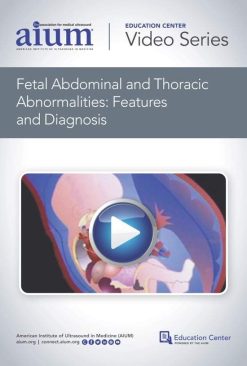2025 Contemporary Issues in Breast Pathology (USCAP) (Videos + Slides)
$65,00
This Product is shared via google drive download link, So please share your correct Gmail id while placing the order .Please note that there are no CME points or certificate associated with this course Samples for Courses Can be found here : Free Samples Here!
Format: 36 MP4 + 30 PDF files
2025 Contemporary Issues in Breast Pathology (USCAP) (Videos + Slides)
Original release date:July 28, 2025
Course Description
This course will provide a comprehensive review and update of the pathologic diagnosis and clinical significance of benign, in situ and malignant lesions of the breast identified in surgical specimens and core needle biopsies. The most current adjunctive immunohistochemical and molecular studies to assist in the diagnosis and classification of benign and malignant breast lesions and to guide patient management will be emphasized.
Target Audience
Practicing academic and community pathologists, and pathologists-in-training
Learning Objectives
Upon completion of this educational activity, learners will be able to:
- Describe the diagnostic criteria and clinical significance of a variety of benign, in situ and malignant breast lesions encountered in surgical specimens and core needle biopsies
- Discuss differential diagnostic problems in breast pathology and the uses and limitations of ancillary immunohistochemical and molecular tests in arriving at the correct diagnosis
- Discuss prognostic and predictive assays in patients with breast cancer
Continuing Medical Education
The United States and Canadian Academy of Pathology is accredited by the Accreditation Council for Continuing Medical Education (ACCME) to provide continuing medical education for physicians.
The United States and Canadian Academy of Pathology designates this enduring material for a maximum of 19 AMA PRA Category 1 CreditsTM. Physicians should claim only the credit commensurate with the extent of their participation in the activity.
USCAP is approved by the American Board of Pathology (ABPath) to offer Lifelong Learning credits for the purpose of meeting the ABPath requirements for Continuing Certification (CC).
Contents
- Intraductal Proliferative Lesions – Ashley Cimino-Mathews, MD
- Update on Classification and Management of LCIS – Stuart Schnitt, MD
- Contemporary Issues in Breast Core Needle Biopsies – Laura Collins, MD
- Digital Slides: Small Glandular Proliferations – Laura Collins, MD
- Digital Slides: Atypical Intraductal Proliferations – Cecily Quinn, MD, FRCPath
- Inflammatory and Reactive Lesions – Cecily Quinn, MD, FRCPath
- Papillary Proliferations – Edi Brogi, MD, PhD
- Challenging Fibroepithelial Lesions – Puay Hoon Tan, MD
- Apocrine Proliferations – Cecily Quinn, MD, FRCPath
- Digital Slides: Fibroepithelial lesions – Puay Hoon Tan, MD
- Spindle Cell Lesions – Cecily Quinn, MD, FRCPath
- Vascular Lesions – Gregory Bean, MD, PhD
- Applications of Molecular Testing in Breast Cancer – Ashley Cimino-Mathews, MD
- Classic Triple Negative Breast Cancers, TILS and the Immune Microenvironment – Ashley Cimino-Mathews, MD
- Special Type Triple Negative Breast Cancers – Laura Collins, MD
- HER2 Low and ER Low Breast Cancers – Stuart Schnitt, MD
- Pathologic Evaluation of Specimens After Neoadjuvant Therapy – Gregory Bean, MD, PhD
- Digital Slides: Spindle Cell and Vascular Lesions – Gregory Bean, MD, PhD
- Digital Slides: Triple Negative Breast Neoplasms – Stuart Schnitt, MD
- Mucinous and Neuroendocrine Lesions – Puay Hoon Tan, MD
- Specimen Handling and Margin Evaluation – Laura Collins, MD
- Epithelial-Myoepithelial Proliferations – Puay Hoon Tan, MD
- Uncommon Clinical Scenarios – Edi Brogi, MD, PhD
- Digital Slides: Mucinous Lesions and ER+ Breast Cancers – Ashley Cimino-Mathews, MD
- Digital Slides: Unusual Breast Lesions – Edi Brogi, MD, PhD
- Uncommon Types of Invasive Breast Cancers – Gregory Bean, MD, PhD
- Contemporary Lymph Node Evaluation – Edi Brogi, MD, PhD
- Applications of AI to Breast Pathology – Stuart Schnitt, MD
- FREE SECTION: Panel Discussion and Q&A
Related products
OBSTETRICS & GYNECOLOGY
ENDOCRINE / NUTRITION
UCSF Obstetrics and Gynecology Update: What Does The Evidence Tell Us 2023
Radiology
ENDOCRINE / NUTRITION
OBSTETRICS & GYNECOLOGY
AIUM Fetal Abdominal and Thoracic Abnormalities: Features and Diagnosis


